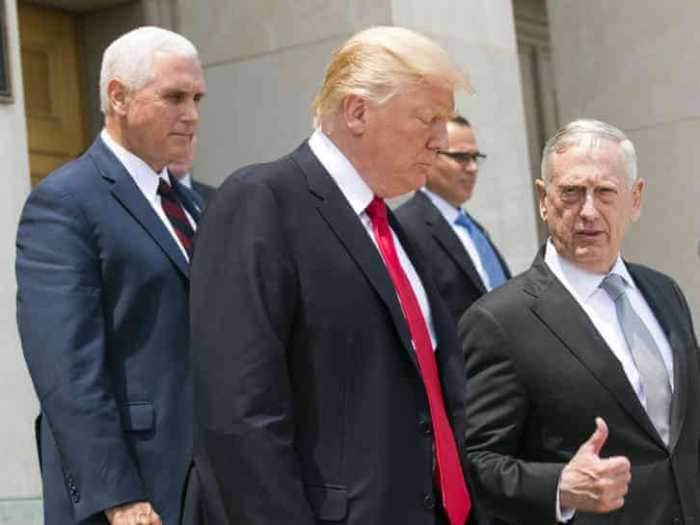US district court judges ruling against President Donald Trump's ban on transgender military service don't say so directly, but they clearly cast doubt on his July claim that he is acting on the advice of his “generals” and other “experts.” | DEFENSE.GOV
President Donald Trump’s July 26 tweet announcing that “the United States Government will not accept or allow Transgender individuals to serve in any capacity in the U.S. Military” — an approach amplified by an official August 25 memorandum — has encountered unanimous resistance from 10 federal judges who have had a say on it.
Nine of the 10 were appointed by Presidents Bill Clinton and Barack Obama. One, US District Judge Marvin Garbis in the Maryland District Court in Baltimore, was appointed by President George H. W. Bush.
As of December 22, the Trump policy had provoked four nationwide preliminary injunctions, with two federal circuit courts of appeals refusing “emergency” motions by the government to stay the injunctions regarding the January 1 date for allowing transgender individuals to enlist.
Justice Department fails in two appeals courts from getting “emergency” relief on enlistments starting January 1
Trump’s memorandum set out three policies: a requirement that all transgender personnel be discharged, a ban on allowing trans individuals to enter the military, and a ban on use of Defense Department or Homeland Security Department funds to pay for sex reassignment procedures for military members. The memorandum assigned the Defense Department the task of figuring out how to implement these policies and reporting back to the president in February. Prior to that, nobody would be discharged or denied medical treatment.
The memorandum also specified that the existing ban on enlistments would remain in effect indefinitely, contrary to a Pentagon announcement in June that it would be lifted on January 1, 2018. In June of 2016, the Obama administration Defense Department had announced that open transgender service would begin on July 1, 2017.
Four lawsuits were filed in different federal district courts shortly after the policy was announced, with complaints alleging an equal protection violation and a variety of other claims. All sought preliminary injunctions to stop the Trump policies from going into effect while the cases are litigated and specifically asked that the Pentagon adhere to the previously announced January 1 lifting of the ban on transgender enlistment.
The Justice Department (DOJ) moved to dismiss all four cases and vigorously opposed the motions for preliminary injunctions.
On December 22, US District Judge Jesus G. Bernal, sitting in California’s Central District in Riverside, became the fourth district court judge to issue a nationwide preliminary injunction on the Trump policy, following DC District Judge Colleen Kollar-Kotelly on October 30, Judge Garbis on November 21, and Western District of Washington Judge Marsha J. Pechman in Seattle on December 11. On December 21 the Fourth Circuit Court of Appeals refused to stay Garbis’ injunction, and on December 22 the DC Circuit refused to stay Kollar-Kotelly’s injunction.
All four district judges rejected DOJ’s argument that the cases should be dismissed because no actions had yet been taken to implement the Trump policies, which were being “studied” by the Defense Department under a September “Interim Guidance” issued by Defense Secretary James Mattis.
The district court judges all accepted the plaintiffs’ arguments that simply announcing the policies and instructing the Defense Department to devise a method of implementing them threw the lives of transgender service members and those planning to enlist into turmoil and uncertainty. The announcement also disrupted plans for sex reassignment surgery for several of the plaintiffs, three of the four judges found.
All four cases are proceeding on an equal protection theory, with the judges finding the plaintiffs have standing to bring their constitutional challenges.
Each judge agreed that the high standards for issuing a preliminary injunction against the government were easily met, embracing the view that policies treating people adversely because of their gender identity should be reviewed by the same standard as those discriminating on the basis of sex, which is called “intermediate scrutiny.” Under this standard, the government bears the burden of showing it has a justification for the policy that is “exceedingly persuasive,” “genuine,” “not hypothesized,” “not invented post hoc in response to litigation,” and “not rel[iant] on overbroad generalizations,” wrote Judge Bernal in his December 22 opinion, picking up quotes from the other three cases.
The government’s “justifications do not pass muster,” he wrote.
Trump’s argument that transgender service is burdensomely expensive, Bernal found, “is unavailing, as precedent shows the ease of cost and administration do not survive intermediate scrutiny even if it is significant. Moreover, all the evidence in the record suggests the ban’s cost savings to the government is miniscule.’
The unit cohesion argument, long used to oppose open gay service in the military, is “unsupported” regarding transgender soldiers, as well, he found, “by the proffered evidence. These justifications fall far short of exceedingly persuasive.”
Bernal concluded, as had the other three district judges, that plaintiffs were likely to succeed on the merits of their equal protection claim, so it was unnecessary to analyze the other constitutional theories they offered.
Bernal also rejected DOJ’s argument that the court should follow customary practice of according “a highly deferential level of review” to Executive Branch decisions about military policy. Quoting a 1981 Supreme Court ruling that stated such deferential review is most appropriate when the “military acts with measure, and not ‘unthinkingly or reflexively,’” he observed, “Here, the only serious study and evaluation concerning the effect of transgender people in the armed forces led the military leaders to resoundingly conclude there was no justification for the ban.”
He agreed with Judge Kollar-Kotelly that “the reasons offered for categorically excluding transgender individuals were not supported and were in fact contradicted by the only military judgment available at the time.”
Bernal also easily concluded that blocking the policy’s implementation and ending the enlistment ban on January 1 were necessary to prevent irreparable harm to the plaintiffs —essentially finding that allowing the Trump policies to go into effect would cause injuries to transgender individuals that could not be completely remedied by monetary damages awarded after the fact.
DOJ argued that “separation from the military would not constitute irreparable harm because it is within the Court’s equitable powers to remedy the injury,” but Bernal countered, “These arguments fail to address the negative stigma the ban forces upon Plaintiffs,” including the “damaging public message that transgender people are not fit to serve in the military. There is nothing any court can do to remedy a government-sent message that some citizens are not worthy of the military uniform simply because of their gender. A few strokes of the legal quill may easily alter the law, but the stigma of being seen as less-than is not so easily erased.”
Federal courts, he noted, have frequently held that “deprivation of constitutional rights unquestionably constitutes irreparable injury.”
Quoting Kollar-Kotelly’s opinion, Bernal wrote, “There is absolutely no support for the claim that the ongoing service of transgender people would have any negative effect on the military at all. In fact, there is considerable evidence that it is the discharge and banning of such individuals that would have such effects.”
With the district judges who have ruled unwilling to stay their preliminary injunctions, DOJ has so far filed “emergency” appeals in the DC, Fourth, and Ninth Circuits, particularly to forestall the opening up of transgender enlistment as of January 1.
On December 21, a three-judge panel in the Fourth Circuit rejected the motion for stay without comment. The next day, a three-judge panel of the DC Circuit issued an opinion explaining its refusal to grant a stay, writing that the government has “not shown a strong likelihood that they will succeed on the merits of their challenge to the district court’s order. As the district court explained, ‘the sheer breadth of the exclusion ordered by the [Memorandum], the unusual’ and abrupt ‘circumstances surround[ing] the President’s announcement of [the exclusion], the fact that the reasons given for [it] do not appear to be supported by any facts, and the recent rejection of those reasons by the military itself,’ taken together, ‘strongly suggest that Plaintiffs’ Fifth Amendment claim is meritorious.’”
The DC Circuit noted in particular the adverse effect that staying the injunction would have on transgender students at the service academies who anticipate being accepted into active service when they graduate. Indeed, the court suggested, federal law treats those students as members of the military, so letting the discharge policy go into effect posed an immediate threat to them.
In seeking “emergency” relief, DOJ contended the Defense Department was not ready to being enlisting transgender people, but in rejecting a stay motion on December 11, Kollar-Kotelly pointed out that DOJ was relying on “sweeping and conclusory statements” without “explaining what precisely needs to be completed by January 1.”
In fact, the Defense Department’s own actions have undermined the emergency motions. The DC Circuit noted that the government failed to inform the court of a December 8, 2017 Pentagon memorandum providing “detailed directions and guidance governing ‘processing transgender applicants for military service.’”
The DC panel also was totally unconvinced by DOJ’s argument that, absent a preliminary injunction, Mattis had any discretion to alter the terms set out in Trump’s August memorandum.
In addition to denying the stay, the DC panel set out an expedited calendar for addressing DOJ’s appeal of the district court’s injunction, with oral argument be scheduled for January 27.
Federal judges may too polite to say so, but the clear implication of their opinions is that Trump lied in his original tweet when he said his decision was made “after consultation with my Generals and military experts.” To date, neither the president nor anybody speaking for him has identified any specific military leaders or experts who were consulted prior to his July tweet. Secretary Mattis, who was on vacation when the president issued his tweet, was, according to press reports, informed it was happening the night before, but is not said to have been consulted about whether this policy change should be made. And the Defense Department has offered no studies to counter the extended government studies that preceded then-Defense Secretary Ash Carter’s announcement in mid-2016 that service would be opened to transgender Americans.
All that adds up to the references in the court opinions issued to date to the lack of “facts’ backing up this policy and the judges’ unanimous agreement that the usual judicial deference to military expertise is inappropriate here.



































